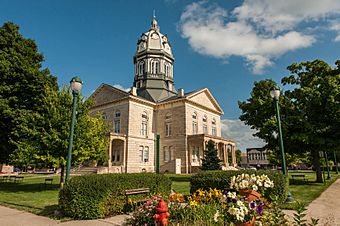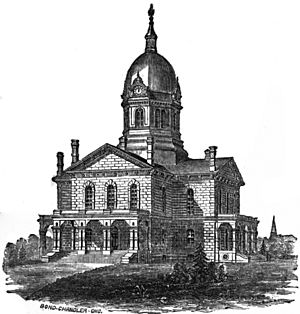Madison County Courthouse (Iowa) facts for kids
Quick facts for kids |
|
|
Madison County Courthouse
|
|
|
U.S. Historic district
Contributing property |
|
 |
|
| Location | City Sq. Winterset, Iowa |
|---|---|
| Area | less than one acre |
| Built | 1876-1878 |
| Architect | Alfred H. Piquenard |
| Architectural style | Renaissance Revival |
| Part of | Winterset Courthouse Square Commercial Historic District (ID15000915) |
| MPS | County Courthouses in Iowa TR (AD) |
| NRHP reference No. | 76000790 |
| Added to NRHP | August 13, 1976 |
The Madison County Courthouse is a historic building in Winterset, Iowa. It's where important county business happens, like court cases and government work. This building is special because it's the third courthouse Madison County has used. It was added to the National Register of Historic Places in 1981, which means it's recognized as an important historical site.
Contents
History of the Courthouse
Madison County started in 1850, and Winterset became its main town, called the county seat. At first, court meetings were held in local stores and taverns.
The county's first courthouse was a simple building made of two log cabins. It was built in 1849 in Winterset. This building was very busy! It was also used as a school, a church, and a place for travelers to rest.
The Second Courthouse
The log courthouse was replaced by a stone building. This second courthouse was designed by G.P. Randall and started being built in 1868. It was shaped like a Greek cross and made from limestone found nearby. It had an eight-sided dome on top. The second floor even had a jail!
Sadly, this stone courthouse was destroyed by a fire on October 2, 1875. Workers saved some of the burnt stone. This salvaged stone was later used to help build the new, current courthouse.
Building the Current Courthouse
Work on the courthouse you see today began in 1876. It was designed by Alfred H. Piquenard, an architect from Chicago. He also helped design the state capitol buildings in Illinois and Iowa.
The building was finished in 1878. It cost about $120,000, which was a lot of money back then! It stands in the same public square where the earlier courthouses were located.
Courthouse Architecture
The Madison County Courthouse is famous for its design. It's known for being built with stone and for its simple take on the Renaissance Revival style. This style was inspired by old European buildings.
Design Details
The current courthouse looks a lot like the second one, but it has more detailed decorations. Both buildings are the same size. The stone saved from the old courthouse had to be recut for the new building. More stone was brought from a local quarry.
Each of the four sides of the building looks the same. They all have a grand entrance with columns. A shiny, silver-colored dome reaches 136 feet (41 meters) high. Inside the dome, there's a 1,500-pound (680 kg) bell and a clock with four faces. The inside of the courthouse features beautiful woodwork made from solid walnut.
 | Charles R. Drew |
 | Benjamin Banneker |
 | Jane C. Wright |
 | Roger Arliner Young |




